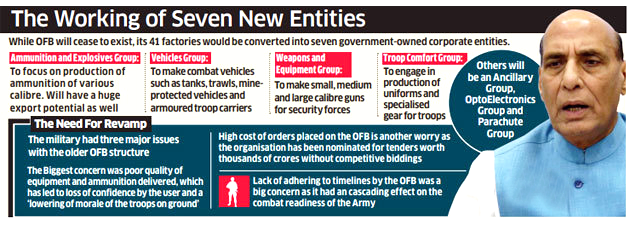Governance
Corporatization of Ordnance Factory Board
- 17 Jun 2021
- 5 min read
Why in News
Recently, the Union Cabinet approved a plan to corporatise the Ordnance Factory Board (OFB).
Key Points
- New Structure:
- 41 factories across the country will be dissolved into seven new Defence Public Sector Undertakings (DPSU). The newly created entities will be 100% owned by the government.
- These entities will be responsible for different verticals of the products such as the Ammunition and Explosives group will be engaged in production of ammunition while a Vehicles group will engage in production of defence mobility and combat vehicles.
- All OFB employees in the production units will be transferred to the new corporate entities on a deemed deputation initially for a period of two years without altering their service conditions as central government employees.
- Pension liabilities of the retirees and existing employees will continue to be borne by the government.
- OFB:
- It is an umbrella body for the ordnance factories and related institutions, and is currently a subordinate office of the Ministry of Defence (MoD).
- The first Indian ordnance factory was set up in the year 1712 by the Dutch Company as a GunPowder Factory, West Bengal.
- It is a conglomerate of 41 factories, 9 training Institutes, 3 regional marketing centres and 5 regional controllers of safety.
- Headquarters: Kolkata
- Significance: A major chunk of the weapon, ammunition and supplies for not just armed forces but also paramilitary and police forces comes from the OFB-run factories.
- Production includes: Civilian and military-grade arms and ammunition, explosives, propellants and chemicals for missile systems, military vehicles, armoured vehicles, optical devices, parachutes, support equipment, troop clothing and general store items.
- It is an umbrella body for the ordnance factories and related institutions, and is currently a subordinate office of the Ministry of Defence (MoD).
- Reasons for Corporatization:
- A performance evaluation by the Comptroller and Auditor General (CAG) in its report for 2019 on the OFB highlights a few of the lacunae, which ails this organisation.
- Overheads (expenses not directly attributed to creating a product or service) constitute a staggering 33% of the overall allotted budget for the year.
- The major contributors being supervision costs and indirect labour costs.
- Delayed Production: The Ordnance factories achieved production targets for only 49% of the items.
- More than half the inventory (52%) was store-in-hand, procured for manufacture but not used within the year by the factories.
- Overheads (expenses not directly attributed to creating a product or service) constitute a staggering 33% of the overall allotted budget for the year.
- The Atmanirbhar Bharat initiative, also calls for the Corporatisation of OFB for: ‘improving autonomy, accountability and efficiency in ordnance suppliers’.
- A performance evaluation by the Comptroller and Auditor General (CAG) in its report for 2019 on the OFB highlights a few of the lacunae, which ails this organisation.
- Importance of new structure:
- The restructure would also help in overcoming various shortcomings in the existing system of the OFB by eliminating inefficient supply chains and provide these companies incentive to become competitive and explore new opportunities in the market.
- It will allow these companies autonomy as well as help improve accountability and efficiency.
- The restructuring is aimed at transforming the ordnance factories into productive and profitable assets, deepen their specialisation in product range, enhance competitiveness and improve quality and cost-efficiency.
- Apprehensions:
- One of the main apprehensions of the employees is that corporatisation (ownership and management lies with the government) would eventually lead to privatisation (transfer of ownership and management rights to the private player).
- The new corporate entities would not be able to survive the unique market environment of defence products that has very unstable demand and supply dynamics.
- Restructuring will result in greater autonomy and lesser government control over the corporation but there is a fear of job loss.
Way Forward
- The corporatisation of OFB is likely to transform ordnance factories into a modernised, state of the art facility with flexible and better decision making in its functioning.
- There is a need to have a reflective road-map for the plan. This can help to ease the apprehensions regarding the corporatization.





